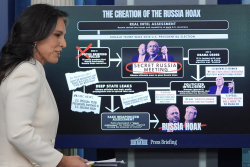The 500 US troops stationed in Taiwan, while no doubt helpful from an insurgency point of view, are dangerous to US-China relations. They’re also totally unnecessary.
In a congressional testimony by retired United States Navy Admiral Mark Montgomery, it was revealed that the US military has roughly 500 personnel stationed in Taiwan. That number has been hotly disputed within Washington, DC, but it is likely accurate.
If the number is accurate, Beijing is now in a quandary. At least on paper, the United States and the People’s Republic of China are committed to the 1978 normalization agreement that had established official diplomatic relations with China. This document explicitly forbids the US military from stationing any of its forces on the island.
China-Taiwan Tensions Have Escalated for Years
The revelation of the presence of American troops on Taiwan also represents a violation of the “One China” policy, which, while uncomfortable and inconvenient for all three relevant stakeholders, has maintained a degree of peace that otherwise would never have existed in the Indo-Pacific. And it comes on the heels of the decision of the United States Marine Corps to station anti-ship missiles at the key strategic chokepoint between the Philippines and Taiwan. That chokepoint, the Bashi Channel, is where any Chinese fleet seeking to blockade the southern portion of Taiwan would have to pass through to achieve its objective.
To be clear, both China and the United States have been maneuvering hard against each other in what some military theorists have dubbed the “gray zone,” or the space between wars. China, too, has grown more provocative against its neighbors—and the United States Navy. That’s to say nothing of the blatantly illegal islands that the Chinese military have constructed throughout the South China Sea in an attempt to achieve the dominant position in the region.
The important thing to remember, though, is that while the US military being stronger than China on paper, it is a woefully overextended force globally. Accounting for only one percent of the overall American population, with a massive ship crisis in its Navy—there simply aren’t enough warships and submarines to go around—a deteriorating warplane problem in its Air Force, an insufficient number of troops in the Army, and a Marine Corps that is still transitioning from altogether different conditions in the Middle East, Beijing understands that the balance of military power in its near abroad—at least for now—obviously favors it.
The Purpose of a “Tripwire” Force Is to Get Killed—and Start a War
The roughly 500 US military personnel stationed on Taiwan are there for two reasons: to serve as a tripwire, and to assist in the defense of the island. If China decides to initiate a blockade and an invasion of the island, those US forces will be insufficient to stop the onslaught. The idea, however, is that they will form the nucleus of whatever resistance movement is formed to combat the likely Chinese invasion. What’s more, by having those forces on the island, should they be killed or captured, those 500 men could become the trigger needed to force an otherwise reluctant United States to send more forces to defend or liberate Taiwan from China.
But this is an absurd notion. The United States cannot afford a war right now. During a recent call between China’s President Xi Jinping and US President Donald Trump, Xi urged Trump to embrace caution when dealing with cross-Strait relations. While Xi’s advice was no doubt self-serving in nature, this advice, given the painful realities of America’s ailing defense infrastructure, is apt.
Trump is not interested in going to war with China over Taiwan. He has made that abundantly clear. Further, Trump has made clear his desire to prioritize foreign commerce over conflict. And while the trade relationship with China has been in dire need of a reset for decades, Trump should continue keeping this philosophy as his unifying principle when dealing with other major world leaders.
Those 500 troops, while no doubt helpful from an insurgency point of view, are dangerous to US-China relations. They’re totally unnecessary, too. Taiwan is an advanced nation with a modern military. If the Taiwanese are incapable or unwilling to stand up for their own freedom, why should Americans risk dying for them?
And while a loss of the Taiwanese island would be a serious threat to US grand strategy in the near-term, if America embraced a program of national rearmament and rejuvenation coupled with hemispheric defense, it need not be catastrophic.
The United States should immediately reorganize its strategy and work to buy time for the country to recover over the next decade by avoiding wars and championing diplomacy plus trade. In the meantime, get those troops out of Taiwan.
About the Author: Brandon J. Weichert
Brandon J. Weichert, a Senior National Security Editor at The National Interest as well as a contributor at Popular Mechanics, who consults regularly with various government institutions and private organizations on geopolitical issues. Weichert’s writings have appeared in multiple publications, including the Washington Times, National Review, The American Spectator, MSN, the Asia Times, and countless others. His books include Winning Space: How America Remains a Superpower, Biohacked: China’s Race to Control Life, and The Shadow War: Iran’s Quest for Supremacy. His newest book, A Disaster of Our Own Making: How the West Lost Ukraine is available for purchase wherever books are sold. He can be followed via Twitter @WeTheBrandon.
Image: Shutterstock / Tomas Ragina.

















